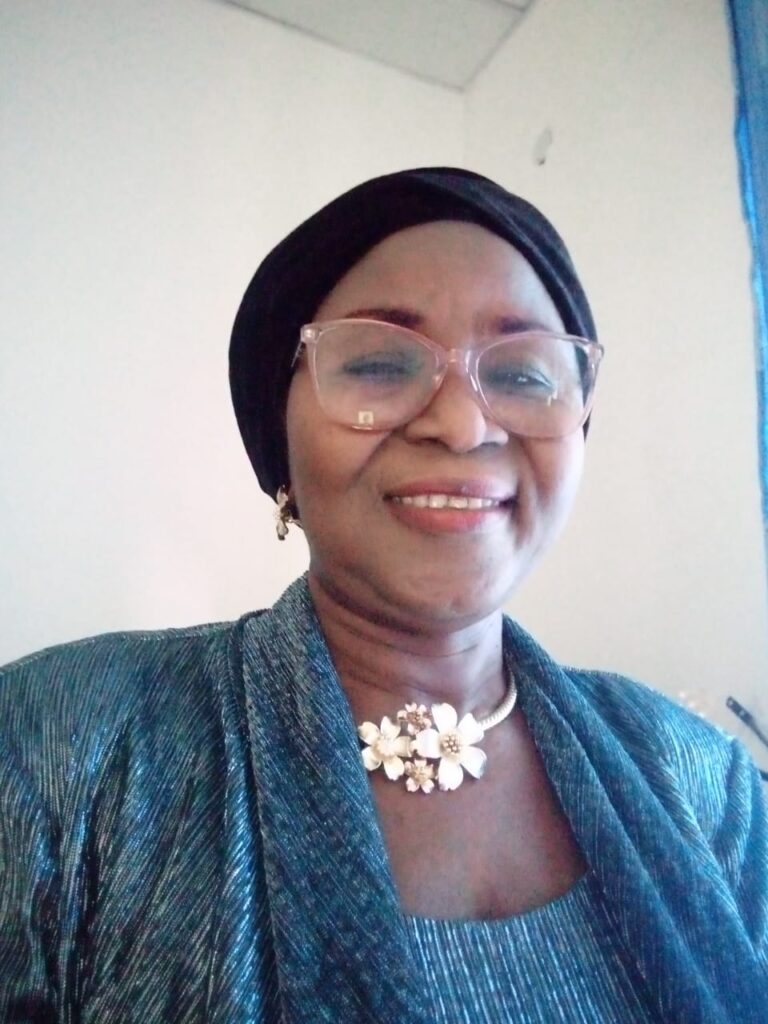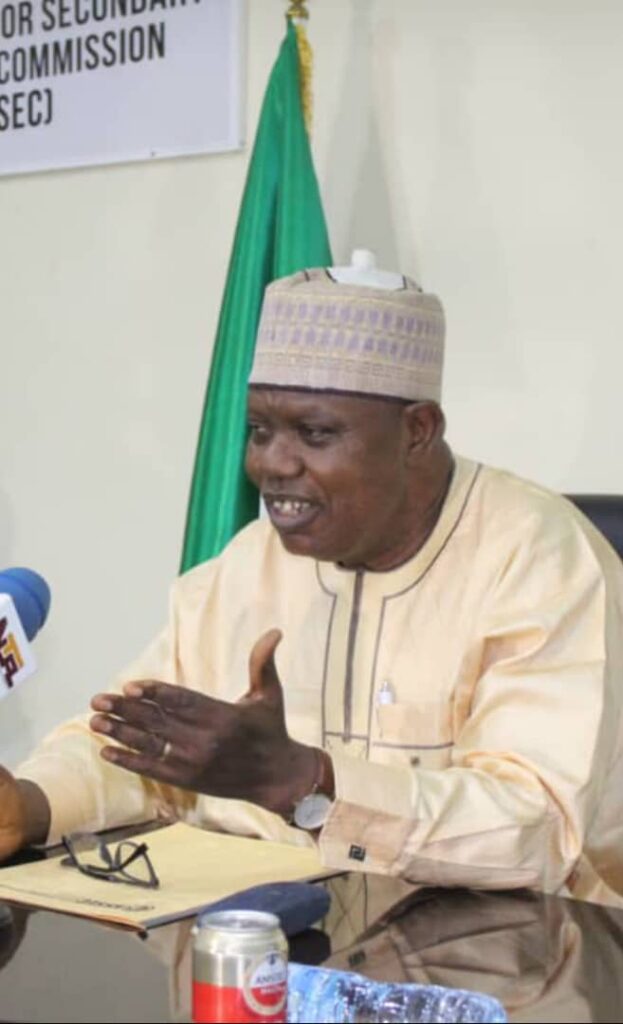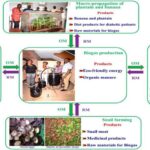My Deep Knowledge of NABDA Helping Me To Reposition and Deliver on Agency’s Mandate – Alex Akpa

The Acting Director General/CEO of the National Biotechnology Development Agency, Professor Alex Akpa, fielded questions from R&D WATCH, touching on the challenges facing the agency, the GMO controversy, how NABDA is on track to fulfilling its mandate and its relevance to the economy, among others. He spoke to Publisher/Editor-in-Chief, TOYE FAWOLE, and Staff Writer FRANKLYN EKEANYANWU.
R&D WATCH: We want you to kindly start by introducing yourself appropriately.
Professor Akpa: I’m Professor Alex Uwadiegwu Akpa, a professor of pharmaceutical microbiology and biotechnology; a fellow of the World Health Organisation (WHO), the Royal Society of Personal Hygiene, the Institute of Corporate Administrators of Nigeria, and more recently, a senior fellow of the International Association of Research Scholars and Administrators. I’m presently the acting Director General of the National Biotechnology Development Agency (NABDA), here in Abuja.
- You assumed the headship of NABDA during the first week of June this year. What were the major challenges that you met on ground?
The challenges were enormous. NABDA was almost in a state of standstill. The compound was filthy, as the toilets were not working. The whole place was weedy and a lot of things had virtually collapsed. To cap it all, there was no dime, no single kobo in the coffers of the agency. We met zero balance. Apart from all these, staff morale was at its lowest ebb and there was tension in the agency, created by all sorts of falsehoods being peddled with some people trying to enrich themselves and all that.
But irrespective of all these, we had to swing into action, facing the challenge aggressively. And I can report that right now we have been able to stabilize the system. We have been able to clean-up the compound and, for the first time in the history of the agency, we have started providing social services to our staff. We are making quite significant achievements in the area of science and innovation and its application in the agency.
How were you able to dance around these challenges?
We had to think outside the box. That was the only way out. We had to find a way of re-energizing and re-motivating the personnel because the staff morale was at its lowest ebb, and that was also affecting not only productivity but also basic functions in the agency. So we managed to quickly build up staff morale by holding regular town hall meetings, where we explained to staff what we intended to do and what we had started doing. They saw some of them. They all saw it was a new era of interactive leadership, communication and inclusiveness. They could see that, for once, they were becoming part and parcel of decision-making process. All these motivated the staff, and that helped us to gradually build up again.
Among all these issues, which one would you say was the most herculean?
Of all the challenges, I think the most difficult was the total absence of funds. It was a zero balance situation that we met on ground. There was nothing virtually we could do as our hands were completely tied. At a stage we had to start deploying, in some cases, for the little things I could afford from my meagre salary. I had to start funding those little things that didn’t cost much, things like stationaries, in order to make sure things were working.
You are a home-grown CEO. How well did that help you to settle down?
Yes, you are right in saying I am home-grown. And that was very useful to my settling down. The fact that I had been in NABDA for over 17 years before assuming the position of Acting DG/CEO was very useful. Because of that, I didn’t need to carry out any special study or investigation before knowing where the problems were. I already knew where the challenges were, and I went straight to those areas and tackled and dealt with them. That was quite useful.
- You just said that you have been here for 17 years. You were definitely part of the management in one way or the other, either as director or Head of Department. To what extent were you part of the situation that you met on ground when you took over as Acting DG?
No matter how senior you might be in any system, once you are below the CEO, you can only advise and give your opinions. The buck stops on the table of the CEO who takes the final decisions. The CEO is on the driver’s seat and provides leadership. He is like a shepherd, leading the way.
You can’t run faster than the leader. Like I just told you, I chose to interact with the rank and file. That is a style which I chose but all the same, I take responsibility for results, whichever way it goes. So, even if I had been here for donkey years, I cannot share in the blame for decisions and actions I did not make or take respectively.
- Recently in an exchange with journalists, you said the issue of farming in Nigeria has gone beyond cutlass and hoe. How does biotechnology come to the rescue?
Biotechnology has a major role to play. There is no way we can feed 200 million people without biotechnology. It’s almost impossible, we must mechanize…
Even mechanization is not enough to solve our food needs in this country any more. We must combine mechanization with appropriate technology, and biotechnology is one of them. Biotechnology not only reduces the application of pesticides, which, of course, we know destroy the environment, but also reduces the application of fertilizers which are chemicals, which also destroy the environment and add up to these greenhouse gases which are part of the problem in the world today.
So, Biotechnology is basic if we are to resolve the food security issues and industrial issues in this country. I just gave you an example of BT cotton and the great impact it could have in the area of revamping our textile industries. Biotechnology is basic, and there’s no way this country can move forward in the area of food production and food security in this country.
As you said a little while ago, you’ve been here for 17 years. So if we say that you know where the corpses are buried as far as this agency is concerned, we are not far from the truth. How far has the agency delivered in terms of its mandate?
In terms of its mandate, the agency, in the past 16/17 years, has not done too badly. But something was missing; we were doing research just for the sake of doing it. A good number of them started and were not concluded due to lack of funds. Even those ones that were concluded, the results were not quickly deployed. And what happened?
In view of the fact that there was nothing the average man can see and associate with biotechnology, the anti-GMO (genetically modified organisms) groups found it easy to hijack our profession. GMO (genetically modified organism), for instance, is a small percentage of biotechnology, some five to 10 per cent and definitely not much more than that. Biotechnology is a very broad technology that impacts not only in the area of health but also in the areas of agriculture, the environment and even in industry.
But the anti-GMO groups will now give erroneous impression that everything biotechnology is GMO, and thus, that it is bad. And because we didn’t make effort to put these things on the ground for the common man to see, many people bought that idea initially.
But we are gradually changing that opinion that had been going on for 16/17 years which has not led us anywhere. So, while the anti-GMO groups thought they would continue to win the race, I saw that we needed to do a paradigm shift…
That seems to explain why putting someone who understands the real mandate of the agency in the CEO’s saddle comes in handy…
Yes. When I came in, I emphasized the need for a paradigm shift. We, as the National Biotechnology Development Agency, must start putting things on ground so that people could be properly enlightened to know what biotechnology is all about and stop linking us up only with GMOs.
It was with this mindset that we started developing the two new varieties of BT-cotton, bio-crops, which is another major engagement that will lead to massive production at commercial level. In fact, before the end of this year, activities will start in this Centre. We will start mass-propagating elite-yam seedlings, yam varieties, and we will produce it at such a scale that farmers will come to take them and people will start seeing and feeling the impact of biotechnology and the relevance of NABDA to the economy.
Not only that, here in this Centre, we will start producing bio-pesticides, bio-normaticides and bio-fertilizers on a large commercial scale. We intend to start making contacts with the Federal Ministry of Agriculture and Water Resources, as well as other relevant ministries to sensitize them about what we have. In view of their capacity as policy makers, we will start the enlightenment about the usefulness of bio-fertilizers as against chemical fertilizers from them.
Bio-fertilizer is way ahead of chemical fertilizer, in addition to being safe to the environment, because it is biologically based. That’s why they are bio-pesticides. So this is what we have started doing.
Apart from bio-crops, we are also doing bio-gas. Nigerian Prisons Service approached us and we have started working with them. In the prisons, we have thousands of men and women, all concentrated in one place, and then their human waste, their faeces, can very easily be converted to bio-gas. It can actually generate enough gas to cook all the food required in the prisons. From it, we can even produce enough gas to generate small amount of electricity for the prison.
- Have you considered the environmental impact of this initiative?
Yes, we have. And I am pleased to announce that the impact of this initiative on the environment is quite positive. You will agree with me that taking the inmates’ human waste away from the point of deposit, in the first instance, is an environment-friendly initiative as it will reduce stench that accompanies the prison system.
Then, by converting same to gas both for cooking and for generating electricity is a bold step to reduce deforestation because the initiative will reduce the quantity of firewood being used.
We all know, of course, that firewood can only come from indiscriminate felling of trees. So it is a save-the-environment initiative. As it is now, the human waste is no longer being wasted or constituting a nuisance to the environment but has become a raw material being converted to be used for products. That project is on and on-going.
Recently, you were on a ministerial delegation to Cuba. Did it have anything to do with these bio-fuel initiatives?
I personally thank God for the life of the Honourable Minister of Science and Technology, Dr. Ogbonnaya Onu. I hope you know he is a scientist and a man of vision, the right arrowhead to pilot the dreams of the President Muhammadu Buhari Administration towards achieving technological revolution for the country.
A few months back, he led a high-powered delegation to Cuba and it was not a sight-seeing excursion or jamboree. Out there, we were able to go into a very interesting arrangement which will now enable us, in the next few months, like in the first/second quarter of next year at most, to start producing vaccines and bio-pharmaceuticals here in our Centre.
We have about 78 hectares of land within our premises here at our corporate headquarters. We want to start utilizing the land mass for what we call bio-economy. You will soon start to see companies springing up – some producing vaccines, some producing pesticides, some producing biological and some producing pharmaceuticals, while others will be into mass-propagation of elite seedlings and tissue culture.
All these are some of the things we want to create here at NABDA. And when this starts happening, people will now see that biotechnology is not all about GMO. It’s much more than GMO. We will now start producing vaccines and diagnostic kits. All the vaccines we use, for now, are imported into this country. These are things we can do and we can produce. We are happy that we are about to go into this partnership with the Cubans.
With the University of Florida, we want to have a special training program, a certification course for graduates of the biological sciences, biochemistry, physiology, and so on. All these people can go for the certification course, and if they go through it successfully, they will be certified, which enables them to work in any biotech establishment anywhere in the world. We hope that this course will commence by next year.
By NABDA producing this and that, would the agency not be tilting away from its mandate as a research institute?
No, we are not deviating at all. Rather, in all these, we are going to have a very strong research component so that if, for instance, we are producing vaccines, we are also going to have a research component that will look at the vaccines produced and look at the efficacy and room for improvement. The implication of all of these is that research can no longer depend on the annual allocation of funds from the federal government. It will go on consistently, all year round. No research will be stopped for lack of funds, because there is a regular source of fund that will buy the equipment required.
Look at the colleges of medicine/university teaching hospitals, for instance. Would you say they are deviating from their mandate as tertiary institutions by engaging in medicals?
Definitely not.
With all of these initiatives, it would seem there is a brand new NABDA. Are the staff adequately mobilized and carried along in these?
It is all a question of leadership. Generally, people are good followers. Once there is good leadership, people will follow. Like I said earlier, it is the CEO that dictates the direction and the pace. NABDA is not an exception to this rule. Initially, there was a resistance from staff. Naturally, if you want to move people away from what they have been used to for years, away from their comfort zone, there will be a resistance. It only took communication and enlightenment to resolve all of these. But now, people are seeing the wisdom in what we are doing and where we are going.
We see your BIODEC Centres scattered all over the country in a multi-campus kind of arrangement. What is the real essence of these BIODEC Centres?
The BIODEC centers are very key and important to the mandate of NABDA, part of which is to harness the bio-resources unique to each particular zone or state. This country is so vast, and there’s hardly any state of this country that does not have bio-resource unique to the environment.
So, these centers are supposed to harness those unique bio-resources, develop them, adopt and apply technology to improve them. For example, if you travel to Abuja from the eastern part of the country, from around Kogi, down to Benue, and even part of the South-East, at certain times of the year, you have so many oranges, mangoes, and so on. However, almost 45 per cent of these are wasted and lost. By their mandate, the BIODEC Centres are supposed to help us to prevent that.
There was a day I was going home, and this woman, late in the evening, had been in the market since morning without getting her wares to sell. She still had a full basket of oranges. The woman didn’t want to carry the full basket home because there was another basket of this perishable fruit waiting for her at home. What they simply do is go to the side of the road and dump it.
We cannot allow this to continue. What stops us from having small cottage industries that can buy these oranges or mangoes at that period and then install small juice extraction machines and then convert them into concentrates? Have small deep freezers with solar power and store the concentrates which companies which are into juices can come and buy. With this arrangement, nothing will be lost during the fruit harvest season. There will be rural empowerment. The Centres are designed to build the capacity of our local population into simple technologies that can provide jobs for the rural people.
From feedback, is the agency getting value for money?
Right now, I cannot say we are getting full value for money. I can’t also say that the Centres have failed. They have not. If you remember, one of the oldest of the BIODEC Centres is the one at Odi, Bayelsa State. The Centre has state-of-the-art equipment, and can be used for all sorts of reforms. Our Centre at Jalingo in Taraba State is doing very well too. Lots of products are coming from these Centres and other centers are beginning to emulate them.
As a research scientist, you have four registered patents. What is the latest concerning them? Are they for commercialization or just for the shelf?
The latest regarding the patents is that I have already made contacts with the right companies. We are studying the four patents and the proposals. We have already classified them into short-term and long-term products for development, and in the next few months, the results of the planning will be seen by everyone.
Within the biotechnology sector, it is being said that with your status of having attracted several international grants for this agency, that you stand head and shoulders above everybody else and that you are fully suited for running this agency…
Yes. There’s no doubt that my international exposure will come very handy in running the agency. I have attracted international grants severally, both before I came here and while here at NABDA. There are many of them, but let me mention just two. For the local research into our production of diagnostic kits, I attracted close to US$23 million. From the World Bank, we have been able to attract over US$9 million.
So, it is an area which I’m quite comfortable with. I think that this position I now find myself in will enable me do more, because I will be able to use this position to identify very smart members of staff under my supervision. We will now develop these proposals to get these monies coming for research. The bio-crops programme, which the Federal Ministry of Budget and Planning have bought into it, has international partners who are also coming with funds to support the project. This is part of the economy recovery and growth planning of this administration. Even for the BT-cotton programme, a huge company in India is investing millions of dollars into the textile industry.
During the recent round-table on exploring investment opportunities in biotechnology and bio-energy development, you promised that under your watch, NABDA would, to use your words, “intensify effort through biotechnology research and development to boost bio-energy production.” Which agencies are you collaborating with in this regard?
We are partnering with the Nigerian Prisons, as I said earlier. In fact we have already started one at Ikoyi Prisons in Lagos. The International Red Cross Society is also interested in this. And of course, the German Government is also interested in the area of bio-energy. These are our major partners in this project, for now.
Since you assumed this position, it has been rather quiet from the unions. Is this because they have their man in the saddle of because you have struck the right chord with them?
For you to work harmoniously with the union, you must be somebody who is naturally is interested in the welfare of your staff, and when I came in, one of the things I told them is that the welfare and well-being of our staff is going to be paramount in my mind. I have followed it up. Having been here for almost 17 years, I knew long ago that NABDA is one of the least paid in the science and tech family, and I promised to do my best to reverse this. I started with the young nursing mothers by providing a creche for them. Now, these nursing mothers do not have to carry their babies into the labs.
We have also arranged with a commercial bank – Keystone Bank – to have a branch here in NABDA. The bank will be working from 8:00 am to 6:00pm. So it means that our staff will now have more time to concentrate on their work.
In addition, we have reached an agreement with the Federal Housing Authority. The managing director of the agency promised us over a hundred houses, and they have already delivered 26 and our personnel have moved in. The staff will not have to pay 10 per cent initial deposit in one month. It will be spread over one year, so that after one year the staff must have paid the 10 per cent and then continue with the mortgage.
We are currently working on having a medical research Centre which will carry out infectious diseases in our society. It will also serve as a place where we can start producing vaccines, other biological pharmaceuticals, and also carry out human trial. With almost a thousand staff in NABDA, there is no clinic. And we have been lucky.
If anyone collapses, by the time we rush that person to the National Hospital, we will be lucky if the person is still alive. The unions always come to me to remind me of the medical Centre. I work with them to make sure we provide services.
Capacity building is very fundamental to an agency in the mold of NABDA. What are you doing in this regard?
Yes. Capacity building is very crucial and very critical for an establishment like ours that is interested in research and innovation. Unfortunately, we have not been able to convince the National Assembly enough to give us exactly what we deserve for that purpose.
To run a place like this efficiently, we need large numbers of PhDs and masters degree holders and different aspects of science and engineering. We cannot do that if we do not have the money for capacity building. Last year, we got about N42 million for capacity building, but this year, instead of increasing, it dropped to 32 million naira. So this will now show you how the problem is.
But irrespective of the huge drop, we have already set up a committee that is working on how best we can deploy this amount of money so as to get the maximum impact of capacity building and training of our staff in critical relevant areas. Like recently, in medical bio-technology, we sent one of the staff to Germany to acquire DNA forensics. This is not only for the identification of human issues like paternity disputes and so on, but also in the application of applying fingerprint for the identification of crude oil varieties. For example, if our crude oil is stolen, you can identify it that it is from Nigeria








